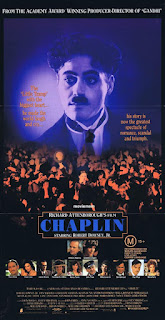‘Chaplin’ offers little new
By DONALD PORTER
Standard-Examiner staff
The equivalent of a Reader's Digest Condensed Version of Charles Chaplin's life opens in movie theaters today under the title “Chaplin.” It’s adequate, but by no means revealing – or, for that matter, perceptive.
After all, Chaplin’s career – as an actor first, and director-star later on – was marked by a series of ground-breaking, hilarious films. He was consistently good at what he did.
And while “Chaplin” gives us an inkling of the filmmaker’s obsessional perfectionism, it seems more preoccupied with detailing his many affairs with underage and/or overwrought females. Director Richard Attenborough (“Gandhi”) displays an eerie fascination with the breasts of his actresses; as a result, you walk away from “Chaplin” thinking the filmmaker may have been a genius, yes, but he was also a leering, dirty old man.
Chaplin is played by Robert Downey, Jr. (“Less Than Zero”), who displays an impressive talent for physical mimicry. Furthermore, he captures –insofar as the shallow script allows – the frustration, self-doubt and ego that made Chaplin the man he was.
Born and raised in England, Chaplin was a child of poverty whose mother (Geraldine Chaplin, who plays her own grandmother here) was mentally ill. Chaplin began on the vaudeville stage, and was summoned to Hollywood by comedy director Mack Sennett. He was a natural, and before too many years had passed, was running his own studio and making his own movies – the most popular comedian in the world.
But Chaplin's personal life was a disaster, as friends like Douglas Fairbanks (Kevin Kline) were wont to point out. Chaplin only seemed to settle down late in life, when his physical decline slowed his randy impulses.
Aside from Downey’s marvelous performance, there are a few surprises. For instance, did you know that Chaplin hid away in a Salt Lake City hotel to edit “The Kid,” so as to avoid having the movie seized in a bitter divorce battle? Or that he apparently saw his first movie in Butte, Mont.? Or that he insulted J. Edgar Hoover at a dinner party years before Hoover headed the FBI, and that apparently Hoover’s vendetta against Chaplin – which eventually resulted in the filmmaker's exile in Switzerland – arose from that incident?
Attenborough also manages to restore some luster to Fairbanks’ reputation by way of Chaplin’s continual praises. And the judicious use of clips from actual Chaplin films serves to validate the film’s reason for being: Charlie Chaplin was the best at what he did, despite the shambles of his personal life.

No comments:
Post a Comment